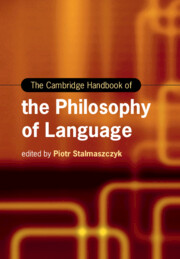Book contents
- The Cambridge Handbook of the Philosophy of Language
- Cambridge Handbooks in Language and Linguistics
- The Cambridge Handbook of the Philosophy of Language
- Copyright page
- Contents
- Figures
- Tables
- Contributors
- Preface
- 1 Philosophy of Language: Definitions, Disciplines, and Approaches
- Part I The Past, Present, and Future of Philosophy of Language
- Part II Some Foundational Issues
- Part III From Truth to Vagueness
- 11 Truth and Theories of Truth
- 12 Reference and Theories of Reference
- 13 Names in Philosophy
- 14 Indexicals and Contextual Involvement
- 15 Natural Kind Terms
- 16 Vagueness in Natural Language
- Part IV Issues in Semantics and Pragmatics
- Part V Philosophical Implications and Linguistic Theories
- Part VI Some Extensions
- References
- Index
14 - Indexicals and Contextual Involvement
from Part III - From Truth to Vagueness
Published online by Cambridge University Press: 12 November 2021
- The Cambridge Handbook of the Philosophy of Language
- Cambridge Handbooks in Language and Linguistics
- The Cambridge Handbook of the Philosophy of Language
- Copyright page
- Contents
- Figures
- Tables
- Contributors
- Preface
- 1 Philosophy of Language: Definitions, Disciplines, and Approaches
- Part I The Past, Present, and Future of Philosophy of Language
- Part II Some Foundational Issues
- Part III From Truth to Vagueness
- 11 Truth and Theories of Truth
- 12 Reference and Theories of Reference
- 13 Names in Philosophy
- 14 Indexicals and Contextual Involvement
- 15 Natural Kind Terms
- 16 Vagueness in Natural Language
- Part IV Issues in Semantics and Pragmatics
- Part V Philosophical Implications and Linguistic Theories
- Part VI Some Extensions
- References
- Index
Summary
Indexicality is a special, systematic kind of context dependence which characterizes expressions such as I, here, or that. The linguistic meaning of indexicals contains a rule that constrains the ways in which their semantic value depends on the various features of the context of their use. If A utters a sentence which does not contain indexical expressions, and B agrees with A, B may simply repeat the sentence uttered. Treating the repetition of what somebody else uttered as constituting their endorsement would, however, end in failure with most indexicals.
- Type
- Chapter
- Information
- The Cambridge Handbook of the Philosophy of Language , pp. 266 - 282Publisher: Cambridge University PressPrint publication year: 2021

